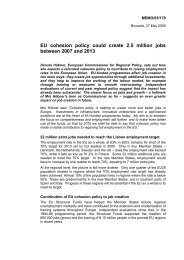Industrial Relations in Europe 2012 - European Commission - Europa
Industrial Relations in Europe 2012 - European Commission - Europa
Industrial Relations in Europe 2012 - European Commission - Europa
Create successful ePaper yourself
Turn your PDF publications into a flip-book with our unique Google optimized e-Paper software.
IE<br />
IT<br />
LV<br />
LT<br />
LU<br />
MT<br />
NL<br />
PL<br />
PT<br />
RO<br />
SE<br />
Jo<strong>in</strong>t consultation procedures are <strong>in</strong> place. Intense social dialogue. Collective<br />
barga<strong>in</strong><strong>in</strong>g every three years, although the crisis has put this system under severe<br />
pressure. Ireland is the only country <strong>in</strong> <strong>Europe</strong> with a constitution which does not<br />
conta<strong>in</strong> provisions on the public service.<br />
The procedural rules for collective barga<strong>in</strong><strong>in</strong>g are established by law. National -<br />
level framework agreements deal with issues regard<strong>in</strong>g two or more divisions,<br />
such as telework, the use of temporary agency workers, or the def<strong>in</strong>ition of<br />
national level barga<strong>in</strong><strong>in</strong>g units or divisions, with<strong>in</strong> limits established by the law.<br />
Industry/sub-sector-wide national collective agreements regulate employment<br />
conditions and <strong>in</strong>dustrial relations and set rules and subject for lower-level<br />
negotiations (<strong>in</strong>tegrative, decentralised contracts).<br />
There is no obligation to negotiate collective agreements <strong>in</strong> the public sector.<br />
Different regulations for different sectors (such as health, education, <strong>in</strong>ternal<br />
affairs) are <strong>in</strong> place.<br />
Jo<strong>in</strong>t consultation at the national level takes place at the Tripartite Council of the<br />
Republic of Lithuania. Legislation gives central agreements effect for public<br />
servants and non-manual workers.<br />
Existence of both genu<strong>in</strong>e and de facto collective barga<strong>in</strong><strong>in</strong>g. For civil servants<br />
and white collar staff unilateral regulations (on basis of proposals of professional<br />
organisations of employees) exist while for blue collar workers collective<br />
barga<strong>in</strong><strong>in</strong>g is important. Existence of jo<strong>in</strong>t consultation procedures at national<br />
level with<strong>in</strong> the Economic and Social Council. On the governmental level a very<br />
centralised dialogue is characteristic.<br />
A tripartite consultation body acts as <strong>in</strong>dustrial tribunal and a Jo<strong>in</strong>t Negotiation<br />
Council <strong>in</strong> matters concern<strong>in</strong>g the service conditions of public servants. Trade<br />
unions are consulted <strong>in</strong> sectoral specific matters and engage <strong>in</strong> collective<br />
barga<strong>in</strong><strong>in</strong>g.<br />
Jo<strong>in</strong>t consultation at national level takes place twice a year between the<br />
government and the social partners. Formally the state has the power to set<br />
employment conditions unilaterally. Formally, statutory civil servants have no<br />
right to collective barga<strong>in</strong><strong>in</strong>g but <strong>in</strong>formal negotiations practices exist.<br />
Consultation of public sector union confederations is obligatory.<br />
Civil servants with special status are denied the right to barga<strong>in</strong> collectively. At<br />
enterprise level, collective agreements may be concluded with the exception of<br />
those employed <strong>in</strong> units under state budget.<br />
The government can make unilateral decisions on public sector terms and<br />
conditions. Consultation is foreseen for issues such as employment programmes,<br />
human resource policy, retirement regulations. Sectoral level negotiations focus<br />
on matters such as remuneration, overtime, and tra<strong>in</strong><strong>in</strong>g. Public sector unions can<br />
engage <strong>in</strong> negotiations but f<strong>in</strong>al decisions are taken by government.<br />
No barga<strong>in</strong><strong>in</strong>g on pay <strong>in</strong> central government; wage levels and <strong>in</strong>creases are<br />
established by government regulation. Separate negotiations for public servants<br />
and contractual staff.<br />
Separate agreements for different groups of employees <strong>in</strong> county councils and<br />
municipalities. For example, the actual pay of each employee is negotiated<br />
locally between the agency and the local trade unions.<br />
45

















